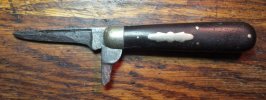r8shell
Knifemaker / Craftsman / Service Provider
- Joined
- Jan 16, 2010
- Messages
- 25,870
I bought an old NYKC pocket knife with ebony handles. I figured I might turn the worn out main blade into a leather punch, or worst case, use it for parts. When it got here, I noticed a very strong smell of mold. I'm not particularly sensitive to mold smells, but it's a very strong smell. Perhaps the knife was stored in a flooded basement for years.
I washed the knife with dish soap, and flushed the works with WD-40, but the smell is still bad enough that I have to wash my hands after holding it. I tried washing it with vinegar, and then scrubbing it with baking soda, and it's still there. I'm trying to think if there's anything short of dipping it in bleach that will kill the mold. I'm afraid that would ruin the wood.
Any advice, or is it beyond saving? Here's a picture, just for fun.

I washed the knife with dish soap, and flushed the works with WD-40, but the smell is still bad enough that I have to wash my hands after holding it. I tried washing it with vinegar, and then scrubbing it with baking soda, and it's still there. I'm trying to think if there's anything short of dipping it in bleach that will kill the mold. I'm afraid that would ruin the wood.
Any advice, or is it beyond saving? Here's a picture, just for fun.


